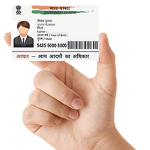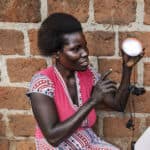Lighting the Way: How the PAYGo Solar Industry is Expanding to Other Life-Changing Products
If you were to meet one of the millions of customers in Africa using a PAYGo solar lighting kit, the first thing they would talk about is how bright their lights are. There’s no doubt that the biggest reason customers buy a solar kit is to replace dim, polluting and dangerous kerosene lanterns and candles. But these households, and the companies providing them with solar home systems, are just beginning to realise the world of additional products and services that PAYGo solar can unlock.
At Fenix, we sell PAYGo solar systems in six markets across Africa, and the very nature of our product and business model means we work with some of the most disadvantaged, rural households on the continent. We build a long-term relationship with these customers through a highly sought-after resource: clean lighting. But starting with the purchase itself, the relationship opens doors for customers to access much more than just lighting. The loan that customers take out from Fenix to pay off their PAYGo kit automatically engages the households in a formal financial service, often for the very first time. A recent study by UNCDF, analysing data from Uganda’s mobile money networks, showed that over 15% of PAYGo customers are opening a mobile money account for the first time to allow them to make payments for their solar, and many more have never used mobile money to save or to access loans.
How PAYGo Solar Opens Doors to a Broad Range of Products
Three aspects of the PAYGo business model mean that the connections we create with our customers allow us to ultimately offer a broader range of products and services through the same payment platform:
- PAYGo solar customers create a formal financial record with Fenix, through digital payments and receipts. This allows us to identify customers likely to be able to afford and pay for additional upgrades.
- Having easily recovered collateral (in the form of the solar home system) and reminders for payments inside a customer’s home via our power systems, mitigates many of the challenges faced by traditional microfinance. When a Fenix customer purchases a follow-on product, their solar home system serves as collateral and incentivizes repayment on this additional loan. If payments are delayed, alongside calls and SMS messages to the customer, turning off the battery system needed to power a customer’s lights and charge his/her phone provides an effective and low-cost reminder that a payment is late.
- Relying on a long-term repayment plan for high-value products in rural homes creates a strong imperative for companies to improve the financial stability of low-income, rural households. Moreover, financing a more expensive solar home system enables “Know Your Customer” (KYC) data collection to be completed at a proportionally lower cost. This KYC data can then be leveraged to ensure that minimal additional information, and therefore the costs associated with collecting it, is needed from customers taking follow-on products.
As a result of the strong relationships that PAYGo providers build with their customers, these companies are able to explore a world of new opportunities to provide life-changing products. Companies like Fenix, Azuri, M-Kopa and PEG have developed new offerings that would never have been viable to launch on their own, but when coupled with PAYGo solar, become a scalable and profitable offering.
From Education to Health: Taking PAYGo Solar Beyond Lighting
For instance, in 2016, Fenix started offering school fee loans in Uganda to help our customers manage the discrepancy between when school fee loans are due and when farmers receive payments for their harvests. Since then, we have provided education financing to help over 40,000 rural families keep their children in school – and at the same time, we have helped prevent households from prematurely selling valuable assets such as goats and cows in order to pay for school fees. And we’re not the only ones taking this approach: M-Kopa launched SolaPesa along similar lines, and has dispersed millions of dollars in loans in Kenya and Uganda in the last couple of years. And other off-grid energy providers, such as Baobab+ and Brightlife, have started to experiment with MFI partnerships to offer microfinance services to their customers.
But these services can go well beyond short-term financing and can even stretch to other financial products. This year, Fenix started experimenting with bundled health insurance offers to customers who have paid well for their solar home systems. PEG, a PAYGo provider in Ghana, has also explored this area, by offering health insurance with premiums added onto customer payments. By bundling insurance premiums into the regular payments made by customers, PEG has been able to greatly reduce the barriers for customers to pay for health insurance, and has helped providers reach customers with coverage that too often remains out-of-reach for vulnerable families. Azuri has also followed suit with a similar approach in Kenya.
PAYGo companies are now aiming to extend a whole range of services through their relationships with rural households, all with the aim of improving financial stability and providing for the plethora of unmet needs in rural communities. Potential offerings include agricultural insurance, business and agricultural loans, savings accounts, and knowledge transfer, through solar TVs, SMS or even sales agents. This knowledge could include information ranging from best farming practices to the price of tomatoes in the local market – or even video content to support children’s education.
Coupling solar products with additional transformative services is a winning proposition for both customers and PAYGo businesses, but the question remains: Would these additional offerings have become available to the same low-income, rural customers without the linkages created by PAYGo solar?
Understanding PayGo Solar’s Unique Impact
The trend towards “microfinance-plus,” in which additional products are coupled with microfinance’s usual credit and savings offerings, would suggest that traditional MFIs may be able to provide the same benefits without PAYGo solar partners. Formal financial services still have very limited up-take, however, in many parts of Africa – and particularly among the rural customer base served by the PAYGo solar industry. Findings from CGAP showed that among smallholder farmers in several African countries, well below 30% use formal financial services, including MFIs. Data from the latest FinScope study showed that in Uganda, only 7% of rural homes used banks or MFIs due to the high costs of operating branches in rural areas, thus leading to poor availability of financial services for rural populations. Among Fenix’s customers, 35% state they do not have any means to access a loan when needed, either from formal or informal providers.
The cost of operating traditional financial institutions in rural areas is one barrier, as the annual costs of servicing a single customer can range from $75-130 for MFIs, according to FSD Uganda, a non-profit promoting greater access to financial services in Uganda. Customer perception is another major blocker: In the field, I’ve heard customers say they are concerned about losing land or having MFIs come and take their cows – or even their pots and pans. People don’t want to stand in the queue at the MFI and let all their neighbours know they are getting a loan. And many just don’t think formal services are for them, with MFIs often being seen as only serving the wealthier members of the community. In contrast, PAYGo solar can reach lower into the base of the pyramid: It has inclusive pricing (Fenix sells solar systems for as low as $0.14 per day) and involves a product which is in high demand by, and effectively marketed to, everyone in the community.
But what about the innovations coming from the emerging world of digital financial services? Fintechs such as Jumo have made a valiant effort to provide inclusive finance by offering high-default microloans to help borrowers build a credit score. And MoKash and other telco-banking partnerships have been able to offer loans based on savings data. These services have had huge impacts in countries such as Kenya and Uganda, and they can operate at a fraction of the cost of traditional MFIs – costing as low as $10-20 to support a customer annually, according to FSD Uganda. Rural customers are often still reluctant to engage, however, and these providers are still focused on the urban market, where they see the most value.
Off-grid solar energy was built with the vision to bring clean, bright, safe lighting to rural homes. But the development of PAYGo solar takes the industry far beyond lighting: It transforms the relationship between customer and company, and introduces a huge opportunity for both PAYGo and other providers to bring life-changing products and services to customers that few other companies see value in addressing. PAYGo solar can have a major impact on customers’ lives, improving the health and education of their families, boosting the growth of their business, and helping them manage risks like low rainfall – all through the value-added services that the business model enables.
Chris Emmott heads the development of value added services and product partnerships at Fenix International.
Photo courtesy of Fenix International.
- Categories
- Energy



